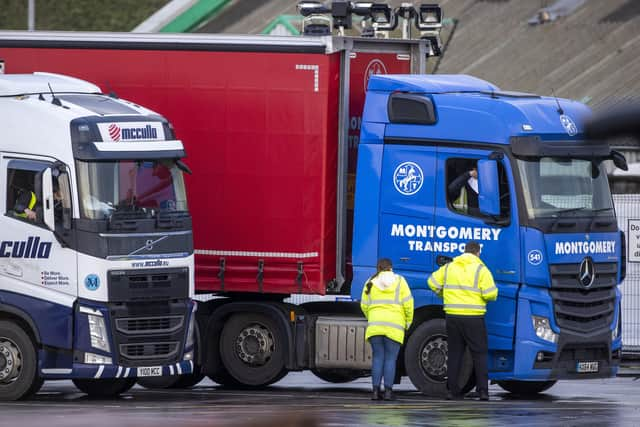Northern Ireland Protocol: Hauliers say full harm of protocol still being masked by easements and financial support schemes
and live on Freeview channel 276
The Road Haulage Association in NI says the full impact of the protocol on trade between GB and NI is being masked by temporary easements and government financial support schemes.
The RHA also says further restrictions on cheaper food imports from outside the EU that will suffer a 30-35% price hike that will hit “the most vulnerable in society” and that the protocol is already undermining the viability of manufacturing businesses in NI that his members deal with.
Advertisement
Hide AdAdvertisement
Hide AdJohn Martin, policy manager for the Road Haulage Association in NI, was echoing concerns about the Protocol voiced yesterday by the chairman of Marks and Spencers Archie Norman.Mr Norman told Radio 4 that after grace periods expire the Northern Ireland Protocol will require lorries to have ‘700 pages of documents partly written in Latin’ to ship goods to NI - as is already required for their shipments to the Republic of Ireland. Mr Norman, who also said the protocol costs “30% more driver time”, claimed the EU is “looking for us to impose comparable controls for Northern Ireland” and warned this would stop the movement of goods altogether in some instances.


Mr Martin told the News Letter that his members were seeing similar problems.
“We are the only trade body that represents the majority of Northern Ireland’s largest hauliers who service the GB to NI supply chain,” he said.
“A number of these businesses are also established in Ireland and recognise the problems highlighted by Marks & Spencer. The full impact of the protocol on trade between GB and NI is being masked by easements and Government financial support schemes including the Trader Support Service and the Movement Assistance Scheme.
Advertisement
Hide AdAdvertisement
Hide Ad“The Government has confirmed these schemes will end in 2023/24 and the full cost of the movement of goods GB to NI will have to be borne by consumers and business here.
“Northern Ireland’s main trading partner is GB where 70-80 % of trade is conducted and the increase in costs and delays etc experienced by Marks & Spencer will be replicated in NI when the protocol is fully implemented. This will probably result in GB based businesses having to review the viability of supplying NI.”
An additional problem, he said, will impact food products - that NI has been sourcing from GB suppliers - which have been sourced from outside the EU.
“These products are normally imported into GB in bulk and processed there. The processed products are then sold in NI within hospitality and high street restaurant outlets and cheaper lines in shops and supermarkets. A sizable amount of these products will be banned from movement to NI. The current estimated extra costs to the logistics sector is a conservative 30-35% which will increase considerably when the current easements end or the protocol is fully implemented with the most vulnerable in society suffering.”
Advertisement
Hide AdAdvertisement
Hide AdHe also affirmed that he has numerous members who are in manufacturing and freight forwarding where the additional costs and paperwork in sourcing and moving products or raw materials from GB to NI is also “prohibitive and undermining the viability of their businesses”.
He added: “There are some benefits to the protocol in that NI has access to the EU single market and if a business solely sources product and sells into the EU single market that’s great, however NI’s largest trading partner is GB where supply chains are well established, highly efficient, just in time and all freight movements are circular ensuring NI businesses and consumers who rely on that market cannot source the same products anywhere else at the lowest price.”
Meanwhile, the industry body ‘Salmon Scotland’ has written to the Prime Minister, raising its concerns about the impact of a trade war impacting hauliers in GB, due to the protocol dispute.
Chief executive Tavish Scott said: “Any deterioration in relationships between London and Brussels which leads to friction at the border, delays and queues for hauliers crossing to France or extra costs for our exporters could put us back to where we were at the start of last year when exports were in chaos.”